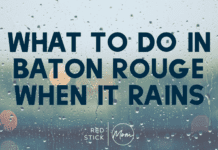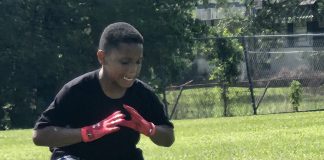Editor’s Note :: The purpose of this piece is not to persuade anyone with regards to their decision on whether or not to get the COVID-19 vaccine, but instead to share one local mom’s story of her personal experience. Our team unanimously agrees that if you have any questions about the COVID-19 vaccine, you should seek advice from your healthcare providers.
I Went Into Anaphylactic Shock from the COVID-19 Vaccine, But that Doesn’t Mean the Same Thing Will Happen to You
I’m not writing about my story to scare you, but to share with you that in my experience, the healthcare providers who are administering the COVID-19 vaccines are prepared in the event the worst-case scenario happens. While playing Dr. Google is a dangerous rabbit hole to go down in my opinion, I looked up some of the vaccine data on the CDC’s website since my attacks. I found that very few cases of anaphylaxis have occurred following the administration of all three emergency use authorized COVID-19 vaccines. I’m a statistical anomaly.
When I went to bed last Thursday night, I knew the next morning was going to be hectic. I had a weightlifting class at the YMCA Friday at 6:30 am. After that, I had to go home and take a quick shower, pay bills because it was my husband’s payday, and head to my local pharmacy with my homeschooled children to get my COVID-19 vaccine. Then I had to clean up my house and get ready to head north to Clinton for a Cub Scouts camping trip.
But after getting my COVID-19 vaccine, my plans for the day and the weekend were quickly derailed and things turned scary very fast.
My Extremely Rare, Severe Reaction to the COVID Vaccine
I’ve purposefully decided not to state which COVID vaccine I received; I don’t want to scare anyone about a specific vaccine manufacturer. This is because after I got my shot, I immediately when into anaphylactic shock.
The first sign that something was wrong was that the shot itself was very painful, much more so than any other vaccine I’ve ever received. I had heard in the media, though, that people reported more pain from the COVID vaccine than say, the flu shot. So at first, I thought what I was experiencing was normal.
After I was vaccinated, the pharmacist who gave me the shot instructed me to sit in the post-vaccination waiting area until the egg timer I had been given, which had been set for 15 minutes, went off. This was a precaution, I was told, so I could be observed in case I had a bad reaction to the shot. Little did I know what was about to happen in the next few seconds.
As I sat down, I felt pain shooting down my right arm, which is the arm in which I received the vaccine. Soon, my right underarm hurt. Quickly, I felt the pain spread toward my back to the top of my ribcage. Next, I felt a weird sensation on the right side of my throat. And then bam – the right side of my throat swelled up. I couldn’t swallow and could barely breathe. The time from when I got the shot to when I realized I was in anaphylaxis was less than three minutes.
Without even saying anything to my 7 and 9-year-old sons who were sitting right next to me on the pharmacy floor, I jumped up and started yelling “Help!” I made my way to the pharmacy consultation window and told the attendant I couldn’t swallow.
The Pharmacy Team Springs Into Action
The next thing I knew my kids and I were in the pharmacy consultation area – the same place where I was administered the shot. A pharmacist offered me Benadryl, which I quickly took. The pharmacy called 911 and also called my husband to tell him to drive over immediately. As we waited for the fire department and paramedics to show up, the pharmacist pulled out an EpiPen and asked if I wanted it. I said yes. I found out later when I was in the ER that the pharmacist had quickly grabbed it off the pharmacy’s shelf to give to me ASAP.
My boys, including my 9-year-old with autism, were very scared, as was I. I told them to pray for me and they quickly bowed their heads and clasped their hands. Meanwhile, I kept begging God to not let me die in front of my children.
By the time the EpiPen was out of its case, two firefighters had arrived and one of them administered the EpiPen. The injection seemed to take forever. At this point, not only was my throat swollen, but my right lung felt squeezed and I was having a lot of trouble breathing. I was also feeling itchy and dizzy.
But the EpiPen did its job incredibly fast. Less than 10 seconds after it was administered, the swelling in my throat immediately subsided. It was as if there had been a balloon in my throat that had been quickly deflated. My right chest and lung still felt heavy, but the tightness and squeezing sensations went away. I asked the pharmacy team to call my husband back and tell him I was feeling better after receiving the EpiPen. The pharmacy team also gave my kids the phone so they could talk to their dad.
It probably took about 20 minutes for my husband to arrive, and 30 minutes for the ambulance to get to the pharmacy. When I was in the ambulance, the paramedic who was riding in the back with me told me the 911 operator had given them the wrong address to which to respond, which was the cause of their delayed arrival. I don’t think I would have made it if I had to wait 30 minutes for the ambulance to arrive with their EpiPen. I’m alive today because of the quick thinking of the pharmacist who grabbed an EpiPen for me. The members of the pharmacy team are my angels and my heroes. They are the answer to my and my children’s prayers.
When the ambulance arrived, they gave me an IV steroid and took me to a local ER. I was observed for a few hours and then released home. About 10 hours after my initial anaphylactic attack, I had a second, biphasic anaphylactic attack while I was lying in my bed. This time, the firefighters and paramedics arrived at my house to take me back to the ER.
I was having trouble swallowing and breathing, but the second anaphylactic attack was much milder than the first, and I didn’t require a second EpiPen. My oxygen levels dropped to 93 on the way to the ER, so the paramedics gave me supplemental oxygen. When I got to the ER, I was given an IV steroid and Ativan to help me calm down. After a slue of tests, I spent the night at the hospital for observation and was released the next day with a regimen of medications to take and instructions to follow up with my primary care provider that next Monday.
My Experience Doesn’t Mean You’ll Have a Bad Reaction Too
Given my very rare and unique experience, I’m following up with both my primary care physician and will also consult with at least two different allergy and immunology specialists. I need professional medical advice about whether or not my severe reaction means I need to take extra precautions with future medications or vaccines, and if there are any implications for my children, too.
What to Do If You’re Unsure About Getting the COVID Vaccine
I’m a freelance writer, not a medical professional, and I’m not here to offer medical advice. But mom to mom, if you’re concerned about or have questions regarding the COVID-19 vaccine, I strongly suggest you talk to your healthcare provider.
While it’s possible the specialists I plan to meet with may tell me to avoid vaccines in the future based on my anaphylactic reaction, I trust that the COVID vaccines are safe for the general population. In fact, we’re currently in the process of getting my husband scheduled for his COVID-19 vaccination.



















